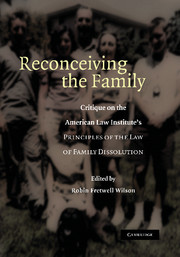 Reconceiving the Family
Reconceiving the Family Book contents
- Frontmatter
- Contents
- Acknowledgments
- Foreword, by Mary Ann Glendon
- List of Contributors
- Introduction
- PART ONE FAULT
- PART TWO CUSTODY
- 3 Partners, Care givers, and the Constitutional Substance of Parenthood
- 4 Custody Law and the ALI's PRINCIPLES: A Little History, a Little Policy, and Some Very Tentative Judgments
- 5 Undeserved Trust: Reflections on the ALI's Treatment of De Facto Parents
- PART THREE CHILD SUPPORT
- PART FOUR PROPERTY DIVISION
- PART FIVE SPOUSAL SUPPORT
- PART SIX DOMESTIC PARTNERSHIP
- PART SEVEN AGREEMENTS
- PART EIGHT JUDICIAL AND LEGISLATIVE PERSPECTIVES
- PART NINE INTERNATIONAL REFLECTIONS
- Afterword: Elite Principles: The ALI Proposals and the Politics of Law Reform, by Carl E. Schneider
- Index
5 - Undeserved Trust: Reflections on the ALI's Treatment of De Facto Parents
Published online by Cambridge University Press: 25 January 2010
- Frontmatter
- Contents
- Acknowledgments
- Foreword, by Mary Ann Glendon
- List of Contributors
- Introduction
- PART ONE FAULT
- PART TWO CUSTODY
- 3 Partners, Care givers, and the Constitutional Substance of Parenthood
- 4 Custody Law and the ALI's PRINCIPLES: A Little History, a Little Policy, and Some Very Tentative Judgments
- 5 Undeserved Trust: Reflections on the ALI's Treatment of De Facto Parents
- PART THREE CHILD SUPPORT
- PART FOUR PROPERTY DIVISION
- PART FIVE SPOUSAL SUPPORT
- PART SIX DOMESTIC PARTNERSHIP
- PART SEVEN AGREEMENTS
- PART EIGHT JUDICIAL AND LEGISLATIVE PERSPECTIVES
- PART NINE INTERNATIONAL REFLECTIONS
- Afterword: Elite Principles: The ALI Proposals and the Politics of Law Reform, by Carl E. Schneider
- Index
Summary
In chapter 2 of the Principles, the ALI proposes sweeping changes to the legal conception of parenthood. It would confer custody and visitation “rights” on a stepparent or ex-live-in lover of a child's legal parent who shared caretaking responsibility for a child for as little as two years (“Ex Live-In Partner”). Such an individual is recognized by the Principles as a “de facto parent,” a term the Principles borrow from case law. The Principles would significantly enlarge the rights these individuals receive under state law, however. With the same stroke, the ALI would dispossess legal parents of the prerogative to decide who continues to have contact with their child.
In many ways, the ALI is engaged in an admirable undertaking: to provide children with enduring contact with the “only father [a] child ha[d] known.” But like much of our experience with “re-imagining” family relations, significant unintended consequences may result. The drafters, without substantiation, simply assume that continuing contact between a child and an Ex Live-In Partner – who will almost always be male – will be an unadulterated good.
The story they tell reads like this: Giving parental rights to a “de facto parent” is necessary to conform to the lived experience of many children, who are “often cared for by adults other than parents[, such as] stepparents … and parental partners who function as coparents.” Continued contact with a de facto parent and his participation in the child's life, they explain, are “critically important to the child's welfare.
- Type
- Chapter
- Information
- Reconceiving the FamilyCritique on the American Law Institute's Principles of the Law of Family Dissolution, pp. 90 - 120Publisher: Cambridge University PressPrint publication year: 2006
- 1
- Cited by


